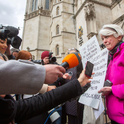The United Kingdom accepted the weakness of its legal and diplomatic position by assenting to transfer the sovereignty of the Chagos Islands—nominally the “British Indian Ocean Territory”—to Mauritius.
It is true that there was not—yet—a binding order under international law that sovereignty had to be surrendered. Indeed, such a judgment may never have happened, as it is unlikely that the United Kingdom would consent to such a judicial determination of the question.
But it is also unlikely if the UK ever did submit to such a case that the tribunal would rule in its favour. One does not always need to have a judicial decision to know the legal situation one is in. The 2015 judgment of the United Nations International Tribunal for the Law of the Sea and the advisory judgment of the International Court of Justice in 2019 made the position as plain as a pikestaff. These two cases showed the direction of legal travel.
The UK knew it would probably lose if and when the matter of sovereignty ever did go before a court of competent jurisdiction, as did Mauritius and, crucially, the United States, which has a key military base on one of the islands. The ongoing legal uncertainty was thereby not going to go away.
The UK had two ultimate options. Either it played for time despite the uncertainty, or it made a deal. As it was, it wanted to show that it would consider a deal and so sovereignty talks were launched in 2022, but seemed to be going nowhere. It looked as if the UK was still playing for time.
But then, seemingly suddenly, a deal was announced earlier this month (though we are yet to see the detail of the agreement and no treaty has yet been published).
On the face of it, the US has tired of the legal uncertainty and made a deal directly with Mauritius. The latter can have sovereignty as long as the former gets a long lease on the island of Diego Garcia, where the military base is sited.
The US is certainly happy with this outcome, and one can see why. It can have its cake and to eat it. It is now rid of the legal uncertainty as to who has sovereignty over Diego Garcia and can keep its strategically crucial base in the Indian Ocean. President Biden released a warm statement about this American win-win, during the run-up to next month’s presidential and congressional elections.
The governing party in Mauritius is also pleased—and the timing of the deal could not have been better, with a general election also coming in November.
The Speaker of the British House of Commons Lindsay Hoyle, however, was less than impressed about this deal being announced during a parliamentary recess. “Ministers should come to the House to announce their policies in the first instance, even if that means waiting a few days. The excuse that there is an election elsewhere in the world is not my concern,” Hoyle said before the foreign secretary David Lammy gave his parliamentary statement on the deal.
The sovereignty deal therefore suited both the US and Mauritius, and that is no doubt why it was done. But what of the UK, which was (nominally) the sovereign power concerned? Well, it appears that what it wanted did not really matter. London would just have to lump it.
This should not be surprising. The Chagos Archipelago was severed from Mauritius before the latter’s independence in the 1960s for the convenience of the Americans. Not only did they want the main island, they also wanted all the islands’ inhabitants to be “evacuated”. And so, from 1965 to 1973, they were.
And although from time to time British politicians claimed that handing over sovereignty would jeopardise American interests—Boris Johnson made such a claim in 2023—the US was relaxed about Mauritius being sovereign as long as the right lease could be executed for Diego Garcia. The fact is that Mauritius, a Francophone ally of India also well supported by other African nations, is a useful country for the US to have on-side.
The weakness in the UK’s position has long been obvious. Back in the mid-1960s, promises were made by British ministers and diplomats that the islands would revert to Mauritius once they were no longer needed for defence, promises which the UN law of the seas tribunal found in 2015 that Mauritius had relied upon to its detriment. And these promises were never translated into a formal treaty.
And then in 2017 there was a remarkable diplomatic manoeuvre at the UN which, for many, was telling about the post-Brexit weakness of the UK.
The British had long relied on there being a need for both sides to submit to the jurisdiction of the international court for the determination of a territorial dispute, and so felt safe from any judicial intervention.
But in 2017 a resolution was carried at the UN General Assembly for the question of Chagos sovereignty to be referred to the International Court of Justice, not as a bilateral territorial dispute but as a question about whether the UK had complied with its general obligations under international law regarding decolonisation.
This wrongfooted the British. They attempted to warn the UN assembly that this would set a bad precedent. But only 14 countries supported the UK while 94 were against it. A further 65 abstained, including many former colonial powers and EU members. The UK was isolated.
Worse was to come. British lawyers sought to convince the court that it should not exercise its discretion to hear the case. But the court unanimously held that it had jurisdiction and by 12-2 that it should hear the case.
And when the court heard the case, it held 13-1 that “the process of decolonization of Mauritius was not lawfully completed when that country acceded to independence in 1968, following the separation of the Chagos Archipelago”. The same 13-1 majority also held “that the United Kingdom is under an obligation to bring to an end its administration of the Chagos Archipelago as rapidly as possible”. And, as a further significant blow, “that all Member States are under an obligation to co-operate with the United Nations in order to complete the decolonization of Mauritius”.
Technically, the ruling was “advisory”—and so there would not be any direct sanction for a breach of what had been decided. But when the ruling went back to the UN, the General Assembly was even less hesitant.
In 2017 94 countries had voted for referring the question to the court. But two years later 116 countries voted to accept the court’s ruling. In part this was because many countries were impressed by the court’s reasoning. But it was also in part because the UK’s diplomatic position was weaker. Only five other countries supported it.
The UK now appeared desperate. Before the UN vote in 2017, there were reports of Johnson, who was the foreign secretary at the time, trying to involve India in what the UK otherwise maintained was a bilateral dispute. There were also reports of threats by Johnson against Mauritius. But none of this worked.
Because of the terms of the resolution—especially the explicit requirement for “co-operation”—passed, the UK government had little option but to open talks with Mauritius about the sovereignty of the Chagos Islands. These talks were commenced under the previous Conservative government. Some politicians may say that such talks should not have begun. But the combination of court judgments and UN resolutions meant that the UK had to at least be seen to be trying.
Now—seemingly to the surprise of many British politicians (and pundits)—a deal has been done: a tripartite arrangement where the UK is the makeweight. The matter has been resolved for us, effectively over our heads.
And although part of the reason for the ruling that the UK had acted unlawfully in the 1960s was that the islanders were not consulted, still less consented, they similarly have not been consulted this time around either.
For the one thing that the deal does not appear to address is the rights of the “evacuated” Chagos islanders. There seems to be nothing that will enable them to return to Diego Garcia or the other islands. And so the matter has been determined for them, effectively over their heads too.














